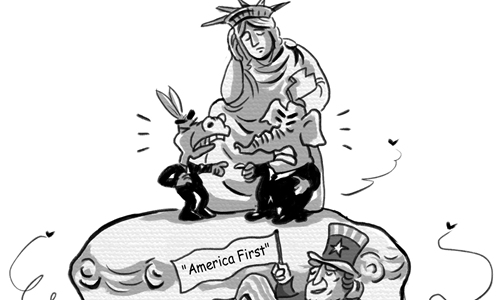Divisive US politics leads to democracy’s fast decay
Source:Global Times Published: 2020/4/20 17:18:40

Illustration: Liu Rui/GT
"LIBERATE MINNESOTA! LIBERATE MICHIGAN! LIBERATE VIRGINIA, and save your great 2nd Amendment. It is under siege!" wrote US President Donald Trump on Friday in a thread of tweets, suggesting that some states' stay-at-home orders are "too tough."Trump's words were obviously meant to encourage protests against restrictions aimed at containing the epidemic. His reference to the "great 2nd Amendment" refers to "the right of the people to keep and bear arms." This tweet might even foster violence.
These remarks come from Trump's well-worn playbook. After the 2015 Paris terrorist attacks, Trump said that "if they had guns…it would've been a much, much different situation," suggesting US gun laws aren't loose enough. And in April 2019, he again repeated his argument. His ideas are dangerous, even more so amid the coronavirus pandemic.
The US itself appears to be in critical situation, with more than 740,000 infected and 40,000 dead. The reality may be even harsher due to the lack of testing and other factors. The president, however, is still focusing on his personal interests with no regard to the tragic situation. He is putting his political pursuits - reelection - above everything. As the country's top leader, he has not served his people, he has sacrificed his people for his own good.
He is always thinking about reelection and the stay-at-home orders have drastically impacted the economy, which was to be his campaign's key bragging point. The Washington Post reported Friday that since Trump declared a national emergency, "more than 22 million Americans have filed for unemployment aid." As a result, Trump is unable to stop himself back from calling for an easing of restrictions against the advice of medical experts and encouraging ugly protests, without regard to people's lives or their health and safety.
Trump might also take containing China into consideration. China has always been conceived by the Trump administration a strategic competitor. Since China has already effectively curbed the coronavirus and begun to resume production, the US is likely sitting on pins and needles, eager to ramp up its own economy.
Trump's words have drawn widespread criticisms. Virginia Governor Ralph Northam blasted Trump on Sunday saying "I do not have time to involve myself in Twitter wars," and "this is not the time for divisiveness."
But the US is indeed heading for even greater "divisiveness."
The US governing system features a balance of power between states and the federal government. And it is undeniable that this mechanism, which so many Americans are so proud of, has allowed the country to function well. And the decision-making power of each state did help the country avoid a complete catastrophe, given the Trump administration's inaction and incompetence.
However, as this public health crisis expands into to the economic, political and social fields with many subsequent effects surfacing, the weakness of the system is being exposed: It allows infighting between the federal and the states at this critical time, aggravates US society's fragmentation and polarization, and will erode the country's long-term interests. And it is the American people who will bear the losses and pain.
Some believe that American democracy is dying. Indeed, the recent chaos in the country has proved its in decay.
The article was compiled by Global Times reporter Yan Yunming based on an interview with Wang Yiwei, professor at the School of International Relations, Renmin University of China. opinion@globaltimes.com.cn
Posted in: VIEWPOINT